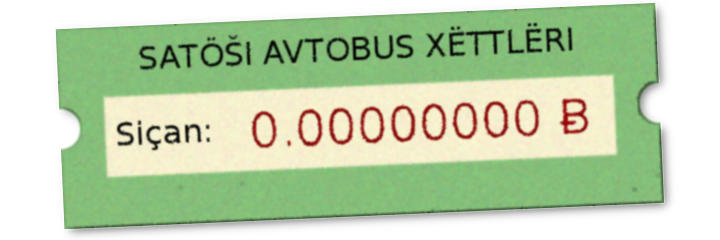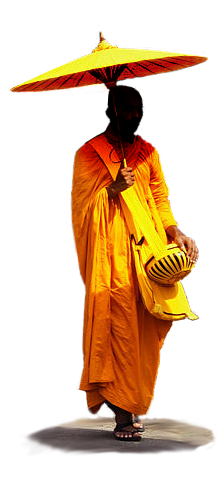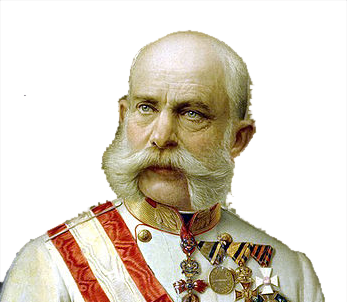
On my way back from Tuva, I had to transfer planes in Shremograd, Bitcoinistan. I arrived late night on Friday the 11th, only to learn that my connection flight had been canceled, and the next one would be leaving only on Monday afternoon. I was not too unhappy; that left me a whole weekend to relax and see a bit of that tiny but quite interesting country. (That is what my friend Rick had told me, back in Stockholm. Now I know why he was giggling as he said that.)

Before going to the hotel, I thought of changing some rubles for the local currency, the bitč. While waiting in line at the money changer booth, a weird incident happened, a harbinger of what I would experience in the next day.
Right ahead of me in the line was a frail old man, who took out from his valise an old shoebox full of hundred dollar bills in neat bundles, which must have been his life savings, and anxiously handed it over to the cashier. To my surprise, the cashier took the box under his arm, closed the booth hurriedly, and then darted across the lobby and out the airport's door, disappearing among the crowd in the street.
The old man just stood there, stunned, still staring at the booth as if he hoped it to reopen at any moment and somehow return his money. A policeman nearby had watched the whole thing without budging. I tried to call him with gestures to come help the old man, but he just shrugged. (Later I learned that theft is not considered a police matter in Bitcoinistan.)
As I was wandering about the hall, a person clad in a black burka approached me and asked if I wanted to exchange the rubles that I still had in my hand. I was rather worried at first and instinctively pulled back, but then I remembered the guidebook saying that mistrust is a capital offense in Bitcoinistan, especially mistrust of masked anonymous strangers. So I pretended to be calm, and negotiated the deal with him (the voice was that of a young man, with a strong Chechen accent).
He took my rubles and handed me a crumpled piece of paper, which he said was a "be-your-own-bank debit card", with a couple of QR codes printed on it. I was pretty sure that I had been scammed; but no -- as I found out later, it was indeed valid and charged with the correct amount, 3.50 bitč.

Anyway, I then went straight to the hotel, with taxi and room paid by the airline. After a refreshing night's sleep and a decent breakfast -- the majik bean paste was quite good, in fact -- I asked the receptionist about excursions. She recommended a bus trip to the old town of Vercz, just three hours from Shremograd. The pamphlet she gave me promised gorgeous views along the winding road through the Karpelian Mountains, a lunch stopover at the ruins of Count Popescula's castle, and a view of Lake Utxo at sunset on the way back. Wonderful, I thought.
Shremograd's Central Bus Station was only a ten minute walk from my hotel. It was still a bit cold but sunny, a perfect day for the trip. Along the way I stopped at a Starbucks (can't avoid them anywhere, amazing!) for a frappucino. I tried to pay with my bitč card, but the cashier did not know what it was. It seems that very few people use the national currency there, strangely.
I tried to pay with a Starbucks gift card that I had in my wallet, but the cashier gave me such an alarmed look that I had to apologize and tell him by signs that it was a just a joke. In the end he accepted a Zimbabwean one trillion dollars bill, and even gave me an extra mint wafer for change.
The bus station was spacious and quite modern-looking -- all steel, glass, and digital displays. But there were scaffoldings all over the place, and the passengers' faces emanated a vague feeling of aimlessness and confusion. Sleek ticket dispensers were scattered through the hall, but I looked in vain for a company roster, a timetable, or a fare table.
I had to ask the girl at the information booth, a lively brunette called Shasha who spoke fairly good English. She explained that there was only one bus company in Bitcoinistan, Satoshi Lines, with a single route that went through all the country's towns. She also told me that the buses had no fixed time schedule (not surprising for a monopoly, I thought), but that was not a problem because a bus would come every 10 minutes, on average, day and night, every day. And also that the trip was totally free.
"What do you mean, free? I thought it was a private company," I asked. I pointed to their slogan on the billboard over the booth, which said, in several languages, "SATOSHI BUS LINES - We take you where no government would".
"Indeed, it is not a government company," she said, giggling. "We here in Bitcoinistan would never use it if it was. But all costs are paid by our non-traveling citizens, in a way that is too complicated to explain. So, travel is free; but you still need a ticket to get on the bus."
Well, learning about the country's economic system was not in my plans for the day, so I thanked her and went back to the ticket machine. Indeed, next to the number keypad there was a big green button labeled "ZADÁRM / TASUTA / FREE". It spit out a ticket with "0.00000000 Ƀ" printed on it, in big red letters.

A door with a turnstile led to the single boarding platform, which was already fairly packed with the most varied and colorful crowd you could imagine. I found myself surrounded by three drunk soldiers with feathers on their helmets, a Gypsy family on their way to a soccer match, a Buddhist monk in a bright orange robe, and an elderly man in shepherd clothes, with a concertina on a shoulder belt and a goat on leash.
As Shasha had promised, after ten minutes or so a bus pulled up. The driver stepped out of the bus, looked at the tickets of the people crowding around him, let some of them board the bus, and departed, leaving most people behind.
I was quite upset at that, because I could see that the bus was still half empty when it left. The Buddhist monk volunteered some words of advice about attachment to material things and accepting one's destiny as it comes. He did manage to calm me down a bit, and we struck a conversation.

He spoke excellent English, with only a slight British accent. He told me that he had previously been a computer scientist working for a large toy manufacturer, but some five years ago he had an epiphany, and quit his job to join a monastery in Mempul, near the Tibetan border. Since then he had been working, dawn to dusk, on a private project for a distributed peer-to-peer belief system, called BitGod (that is what I thought he said), that would transcend churches and governments, and bring frictionless salvation to humans anywhere on the world, without the need for a trusted divinity.
Yet he could not easily disconnect from the world that he had left behind. Since the monastery did not have TV or internet, once a year he took time off his project to come to Shremograd, the nearest place where he could buy a copy of The Times and the latest issue of Newsweek. He was on his way back now; he intended to take the bus only to Konșenșu, the first stop, and then a footpath through the mountains that went all the way to Lhasa through Mempul.
Even though the things he said made no sense to me, he was very lucid and convincing -- the kind of person who could easily start a religious cult, even without trying.
We had to wait a good half an hour for the next bus. As before, the driver only admitted half a dozen of the waiting passengers -- including my monastic friend, but not me! Leaning out of the window, the monk glanced at my ticket and told me that it was no good, I had to pay a minimum fare. It tried to object -- Shasha had been quite emphatic that bus travel was totally free in Bitcoinistan -- but he interrupted me, and only had time to shout, as the bus was leaving: "If you don’t believe me or don’t get it, I don’t have time to try to convince you, sorry."
I pondered his words, and thought that I should clear the matter up with Shasha. To my chagrin, I discovered that there was no way to leave the platform, and no station staff that I could talk to. In the end I found a way, by climbing up some pipes, squeezing through a ventilation opening, and tiptoeing hurriedly through the ladies' bathroom.
Shasha was apologetic and explained that, yes, I could travel for free, but that would put me in the lowest priority category, and then I might have to wait many hours, or even days, for a driver willing to carry me. Bitcoinistani residents were quite used to it, but she understood that foreigners may find it inconvenient. To improve my chances of being picked up, she explained, I indeed had to pay a minimal transportation fee. (There was once a time when no one had to pay anything at all, but that ended years ago, when General Dashjur deposed King Gawain and changed the rules.)

She tried to explain how to compute the correct fee; but then, sensing that I was not exactly a math genius, she offered to do it for me instead. She measured my height with a surveyor's sight, then took out a large caliper-like tool and measured the width of my skull, from ear to ear. Then she asked how long it was since the last time I traveled by bus. She entered all that data into her tablet, and wrote down the amount on a slip of paper.
For good measure, she followed me to the ticket machine and helped me to use it. I was about to enter the amount she had written down, but she stopped me and explained that it did not work that way. Instead, I had to first let the machine scan the QR code of my bitč card, then enter the amount of change that I expected to get back. The machine then would compute the fee as being my account balance minus the change amount. Finally I got a new ticket with "0.00010023 Ƀ" on it, and a new bitč "debit card" for the return change.
Shasha escorted me to the turnstile, giving me tips about the local cuisine. Before crossing, I tried to rub her nose, which, according to the guidebook, was the traditional way to say goodbye to a female [sic] in Bitcoinistan. But I must have skipped some important detail, or the guidebook author did not know what he was writing about; because she instead slapped me on the face and marched away, stiff and stomping like a Lithuanian Mēmskadets at the Changing of the Guard.
Well, anyway, I was back on the platform, suddenly feeling eager and hopeful -- as if I was a freshly ordained knight, and the new ticket in my hand was my Excalibur.
A bus arrived only a minute later; but the driver did not even open the door, and drove off -- with the bus totally empty, as it came. The next one, on the other hand, picked up enough passengers to fill most of the seats -- but not me! Worse: I managed to read some of the tickets of the lucky guys, and some of them were quite a bit lower than mine, even zero. I complained loudly to the driver, but he just shrugged. After the bus left, a young tourist explained to me, in broken Swabian, that each bus driver indeed had the right to choose his passengers as he wished, and did not even have to explain why.
Then I noticed that most of the passengers around me were holding tickets with higher value than mine. As I feared, the next bus driver let them board, but left me and all the other cheap guys behind. And the next bus, again, just drove by, empty, without stopping.
I thought that I had better get a higher-valued ticket too. By then it was already lunchtime, but I was determined to get on that damn bus, even if it took me the whole day. I called the airline and postponed the return flight to Wednesday, and then went back to the station hall by the same unorthodox route as before.
I did not dare to ask Shasha for help again. Fortunately I found in my guidebook a whole chapter on the operation of Bitcoinistani ticket machines; which started off with a bold red warning that I had to be extra careful, because I could easily lose all my bitč with a single banal mistake. But it all went well, and soon I was back on the platform, holding a ticket for 0.00020046 Ƀ.
While waiting, I noticed that my rivals too had decided to upgrade their tickets, and I was again one of the lowest. My heart sunk, and I felt like I was trapped in a Kafkian nightmare.
I pinched myself. The pain, the noise, my sore feet, the smell of diesel fumes and goats -- everything told me that, unfortunately, it was not a dream.
I pondered whether it would be worth to top up my ticket again, or whether I should just sit in a corner and wait for the janitor to sweep me away.

But then another bus came, and this time the driver just let everybody on board, without looking at their tickets. Even the old goat shepherd, who was still stoically holding his zero-bitč ticket.
I was so relieved that I promptly forgot all the time and bitč that I had wasted. The bus was modern and comfortable, and I had a double seat all by myself. I folded my legs in the lotus position and, with my eyes closed, went through all muscles in my body, one by one, commanding each one to relax until further notice.
I opened my eyes again when the bus was pulling out of the station. I tweeted to my followers "Off to Vercz, finally". Rick promptly tweeted back "Are you sure? ;-)" I was about to ask what he meant, but I was interrupted by the most extraordinary event of all my life.
Without any warning sign, without a poof or a wisp of smoke, the bus and its diver simply disappeared! I found myself tumbling over the pavement, in the midst of a jumble of passengers, luggage, and assorted farm animals.
Fortunately the bus was not up to speed yet, and I got only some light scrapes and bruises. I found my backpack and tried to help other passengers to gather their belongings. I was in a shock, and did not know what to think or feel. Was that mint wafer really just a mint wafer, I wondered. Yet, while some of the passengers were grumbling and cursing, they did not seem baffled by the miracle -- as if it was just an unpleasant but quite banal incident.
Not even the goat seemed to be overly upset: it just stood there on the sidewalk, staring at me with its devilish goat eyes. I led it to the owner, and, as we were walking back to the station, I tried to convey my bafflement with gestures to the old man. But he just kept repeating the same incomprehensible word, "Ør'fun! Ør'fun!"
Well, sorry, but I did not see any fun in it, not at all.

(To be discontinued)
Jorge Stolfi
Original June 6, 2015
Corrected June 8, 2015
 -
Image originals from the Wikimedia Commons
-
Image originals from the Wikimedia Commons
Last edited on 2015-06-08 14:50:15 by stolfilocal